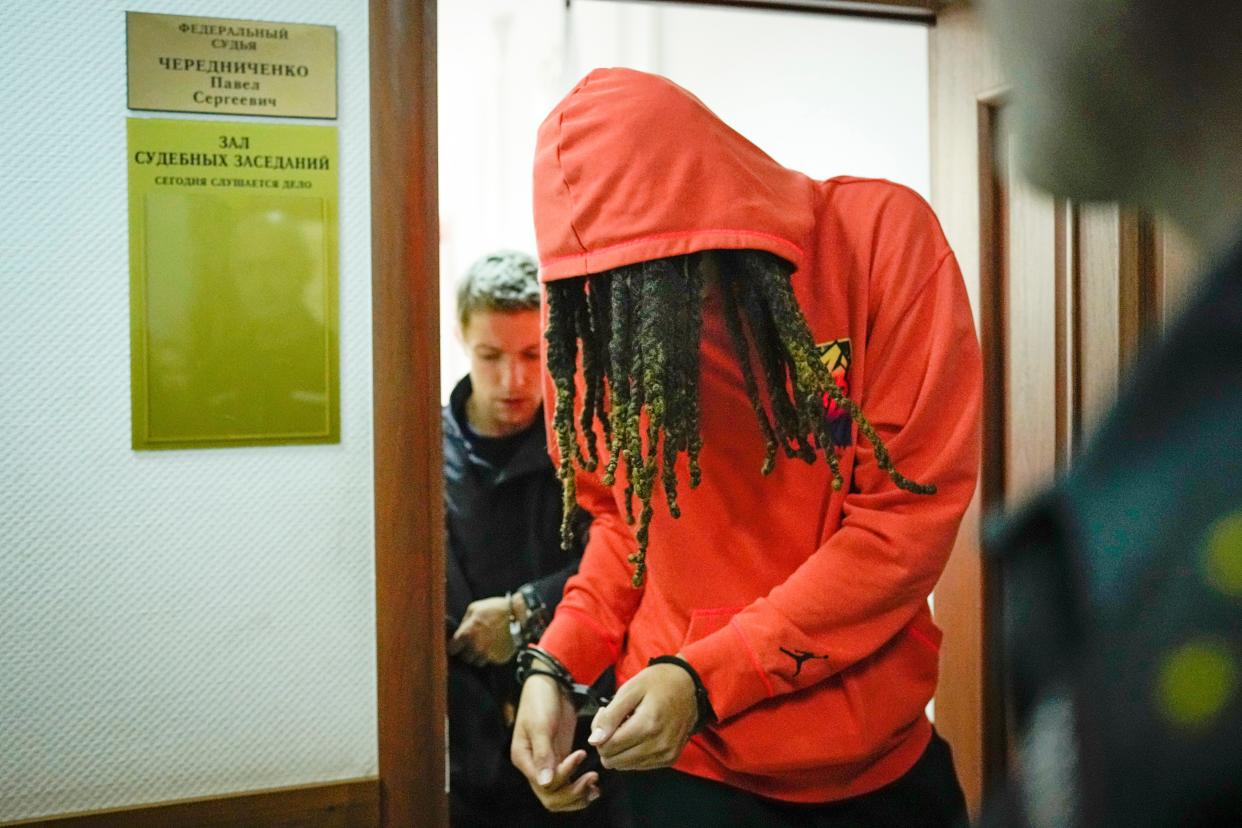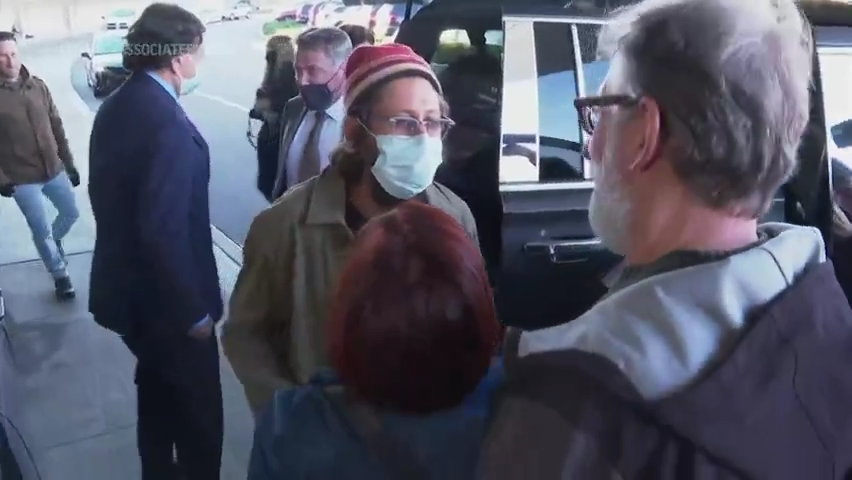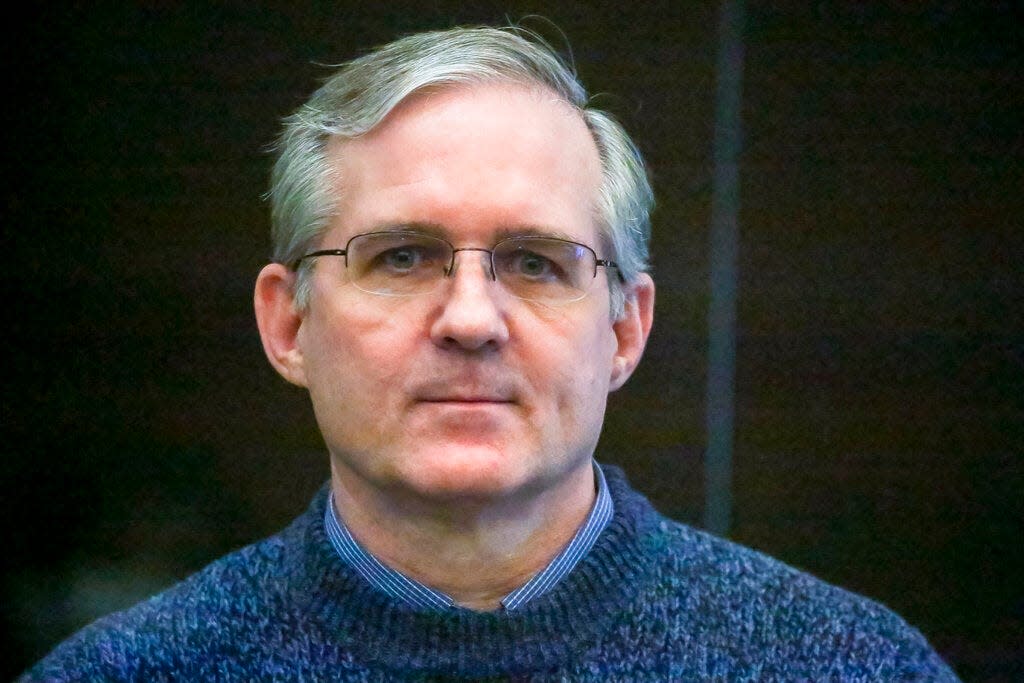'We just know we want our brother home': Inside the secretive world of freeing American hostages abroad
When Myanmar's military leader heard the flattering comments from Bill Richardson, a former U.S. ambassador to the U.N. and onetime governor of New Mexico, Min Aung Hlaing took off his glasses, leaned in and opened up about how it felt to lead when leadership wasn't necessarily ever his intention, about his family, about his life.
Min Aung Hlaing was a man used to crushing dissent through violence, covert interrogations and fear. But he was also shy. The seasoned American diplomat told the general that his was a "quiet leadership," one all the more powerful because it deliberately avoided melodrama, bluster and bombast.
The name Danny Fenster, a wrongfully imprisoned American journalist, was not mentioned until near the end of the heart-to-heart.
Stay in the conversation on politics:Sign up for the OnPolitics newsletter
That's according to Mickey Bergman, a former Israeli Defense Forces paratrooper who is an international hostage negotiator and has worked with Richardson to free Americans held captive by hostile governments from Iran to North Korea.
"We talked about COVID. We talked about the discussions we had with his ministers. About humanitarian needs. We kept that meeting that way," Bergman has said of the initial conversation with Myanmar's commander-in-chief. Bergman believes that talk led to Fenster's release from a Myanmar prison six months after he was detained over false and vague claims he violated immigration and terrorism laws.
Fenster was escorted out of the country by Richardson and Bergman on a private plane in November 2021. Bergman recounts the episode at length on a Foreign Policy magazine podcast that details the techniques the Richardson Center, the charitable organization founded by the former governor, uses to to bring wrongfully detainedAmerican prisoners and hostages home.
Yet such is the secret, chaotic, divisive and sometimes peculiar world of prisoner negotiation that some captives, even after they are freed, don't fully learn just how they got home. And one of the murkier aspects of such negotiations is the work on the ground via third party "access agents," including unconventional – and some fairly shady –ones, according to former U.S. government officials and others involved.
Brittney Griner lands in the US: What to know about WNBA star's release from Russia
Who is Trevor Reed?: Freed former Marine had been jailed in Russia since 2019
“The art of hostage negotiating, the art of any of this flesh peddling, is just the creativity to find the deals that work," said Jason Amerine, a now-retired Green Beret and Army lieutenant colonel who participated in secret U.S efforts to free Army Sgt. Bowe Bergdahl in 2014, five years after he deserted his post in a remote part of Afghanistan.
Amerine used Pakistani intelligence officials and the Taliban to negotiate with Bergdahl's captors, the Haqqani Network, a lethal and sophisticated insurgent group.
"To get the dominoes to fall takes a lot of creativity. It takes a lot of networking," he said.

Working in the shadows
The Richardson Center works on behalf of families alongside – and at times in conjunction with– the U.S. government. It played a role in the release of basketball star Brittney Griner from a Russian prison, and before that in the case of Trevor Reed, a U.S. Marine veteran from Texas detained in Russia for 985 days. It is also trying to free Paul Whelan, a former Marine who was left out of the Griner trade despite Biden administration efforts to include him in the swap for convicted global arms trafficker Viktor Bout.
Much of this work is done in the shadows.
Griner, for instance, has so far said little about the circumstances that led to her brush past Bout on the tarmac of an Abu Dhabi airport and freedom.
In an Instagram post Friday, Griner thanked a long list of people for advocating for her release, including Richardson and Bergman, the Bring Our Families Home Campaign, Special Presidential Envoy for Hostage Affairs Roger Carstens and "the entire Biden-Harris Administration.”
Fenster, 38, said he believes Richardson's intervention played a big role in his release. He also doesn't want to discount the possibility that Myanmar's authorities may have been looking for an excuse to get rid of him.
"They had a lot of people asking them to let me go and maybe they were just like, 'Well, here's somebody to give him to,'" said Fenster, who stressed he remains hugely appreciative to Bergman and Richardson. The U.S. government and other third parties also worked on Fenster's case.
Danny Fenster: Michigan journalist shares details of Myanmar jail release
American graduate student Xiyue Wang was swapped in December 2019 for an Iranian scientist after more than three years in an Iranian prison over fake spying allegations.
In an interview, Wang said U.S. officials, citing security clearances he does not possess, have declined to disclose the background details and diplomatic back and forth that concluded in his release. To this day he knows "frankly, not much."
But Bergman, who worked on his case, has said the genesis of Wang's release can be traced to private meetings between Richardson and various Iranian diplomats, including then-Foreign Minister Mohammad Javad Zarif, during the summer and fall of 2019. The U.S. government could not participate because Washington and Tehran do not have formal diplomatic relations.
U.S. government contractor Alan Gross was returned to the U.S. in 2014 following half a decade in a Cuban prison for distributing communications equipment to members of the island's small Jewish community. A more salacious detail connected to his release eventually came out: U.S. officials helped arrange for a Cuban spy serving two life sentences in California to impregnate his wife while behind bars.
Negotiations never start with "what do you need me to give you in order for you to give me the prisoner," Bergman said in the podcast. Rather, they begin with a "soft conversation" about aid, goodwill, medicines. "It's not a policy concession," he said.

"Reinventing the wheel" every prisoner swap
There are 60 Americans currently being held as hostages or wrongfully detained overseas, according to the James W. Foley Legacy Foundation, a hostage advocacy organization named after a journalist abducted and then murdered by his Islamic State group captors, also known as ISIS, in Syria.
For decades, hostile nations and terrorists have taken Americans hostage as a bargaining chip.
The Iran hostage crisis of 1979 was one of the largest, with 70 American captives. It dragged on for 444 days. They were freed on the day Ronald Reagan was inaugurated.
By 2014, the Obama administration was under fire for allegedly refusing to negotiate with ISIS. Videos of Foley and other Westerners being beheaded were circulating widely on the internet. Meanwhile, efforts to win Bergdahl's freedom from the Haqqani Network were going nowhere. (Bergdahl was a hostage, not a wrongful detainee, because he walked off his base in a conflict zone. He received a dishonorable discharge from the Army but avoided time in a U.S. prison.)
Bowe Bergdahl: Avoids prison time, will receive dishonorable discharge, judge rules
Amerine, a decorated veteran of the U.S. war in Afghanistan, was tasked with helping free Bergdahl. He quickly realized that various units within the Pentagon and State Department had wrongly assumed some other agencywas trying to negotiate with the Haqqani Network and the Taliban that held powerful sway over it.
"It was totally counterintuitive since we were at that point 14 years into the war on terror and we didn't have a way of actually doing deals routinely," said Amerine.
"Everything was ad hoc. You had to reinvent the wheel every time."
The families shared that experience.
"I tried to work with the U.S. government when Jim was captured. It was terrible at the time. It was nobody's job. There was no inter-agency group working on this issue. It was just up to the administration as to whether his captivity was a priority, and with Jim, it wasn't," Foley's mother Diane previously told USA TODAY.
An American is detained or goes missing abroad: What happens next?
Staying on message with the White House
Amerine, in testimony before Congress, and others pushed successfully for the creation of a "hostage fusion cell" and special U.S. envoy to strategize and coordinate such prisoner swap negotiations.
In August 2015, the Obama administration did just that, creating the Office of the Special Presidential Envoy for Hostage Affairs.
“The most typical way it happens is through intermediaries; you find access agents and you say, ‘Hey, what do they want?’ And then you're just playing the telephone game to work it out,” Amerine said. And with the special envoy in place, he said, "you have people you could take it to who could basically dissect it and take it to the White House to get authorization to carry out the deal.”
That’s what happened in Griner's case and others, according to Amerine and other former U.S. officials, including Trump National Security Adviser John Bolton.
During the Trump administration, Bolton and other top national security advisors told the president that "quid pro quos" like those sought for Whelan and others deemed unfairly detained were bad for anyone other than spies and prisoners of war because they incentivized governments like Iran and Russia to simply "stockpile" civilian Americans to be used as political bargaining chips, Bolton told USA TODAY.
But ultimately the president is the one making the final decision, and Trump often ignored their advice, Bolton said.
Bolton too stressed the importance of using whatever independent liaisons are available, especially established ones like Richardson – as long as they stay on message with the White House.

Paul Whelan: Russian prisoner swap brings home Brittney Griner, but not Whelan
"I think the difficulty is that these groups measure their success by how many Americans they get released. And I think they're more or less indifferent to how it gets done," Bolton said. "So if you're taking the position that you don't want to do quid pro quo swaps, to have somebody else involved who has done and advocated those kinds of swaps sends a message to the captor that is confusing at best and potentially harmful."
Bolton declined to discuss the details of cases during his tenure, including Whelan's. But, he said, "If there was a way to make an argument or make an appeal to some authoritarian government to release somebody for reasons that a U.S. government official couldn't articulate well enough, I didn't have any problem with it."
Neither does David Whelan, brother of wrongfully detained former U.S. Marine Paul Whelan.
"We're a portrait painter, an engineer and librarian. That's who Paul's siblings are. And we don't have any idea how any of this works," he said in an interview.
"We just know we want our brother home, and so to the extent we can get the people who can get the work done, who know the information to do it, we put our trust in them."
This article originally appeared on USA TODAY: Brittney Griner, Viktor Bout and how prisoner negotiation works
